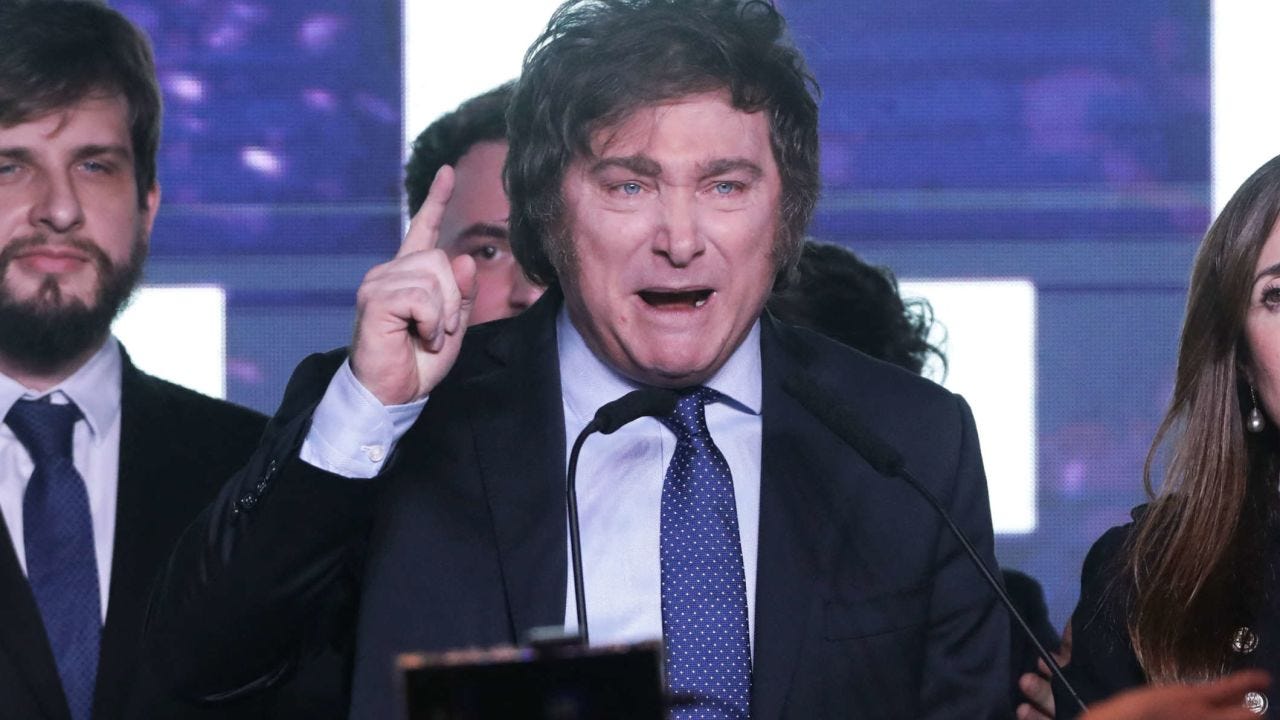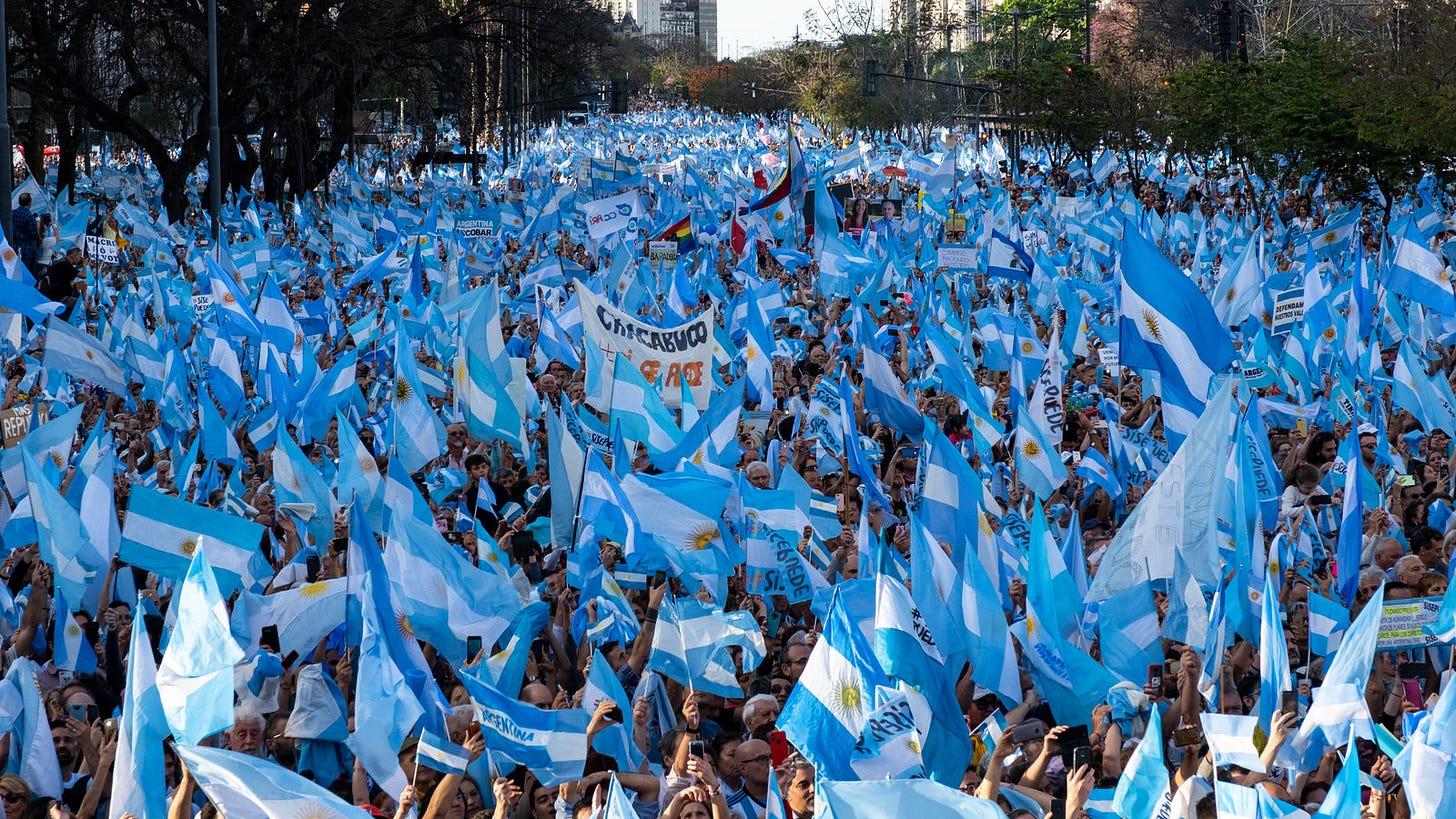Amidst An Economic Quagmire, Argentines Embrace A Libertarian Populist
Milei's triumph signals the extremities a populace will seek when faced with a bleak economic outlook.
On Sunday, Argentines elected Javier Milei, a far-right libertarian economist, as their next president, rejecting the established Peronist party that has dominated the country’s politics since the 1940s, marking a significant lurch to the right.
On a 78% turnout, Mr Milei won 56% of the popular vote, defeating Sergio Massa, the incumbent finance minister, who was left with 44%.
Mr Milei is not an established politician; in fact, that’s part of his charm. He burst onto the fairly insular political scene equipped with an inflammatory rhetoric, an embrace of conspiracy theories and a series of radical proposals that he asserts are necessary to confront a corrupt and decaying political and economic system.
He ascends to the presidency at a noticeably bleak period in Argentina’s already tumultuous history. Annual inflation has soared past 140% - the third highest in the world - more than two in five Argentines now live in abject poverty, and the value of Argentine’s currency, the Peso, has plummeted. In April 2020, at the start of the pandemic, $1 bought 80 Pesos. This week, $1 bought nearly 1,000 Pesos.
To confront this malaise, Mr Milei argues that the solution is a drastic break from old politics. His campaign centered on pledges to “blow up” the central bank and dollarize the economy, illustrated by him smashing miniature versions of the bank and hoisting giant $100 bills with his face on them at rallies.
His other campaign prop was a chain-saw that he would wave around at rallies. The saw represented the deep cuts he wants to deliver to government spending, including lowering taxes; slashing regulations; privatizing state industries; reducing the number of federal ministries from eighteen to eight; shifting public education towards a voucher-based system and public healthcare to insurance-based; and cutting federal spending up to 15% of Argentina’s gross domestic product.
If Milei’s economic prescriptions were not extreme enough, his flirtation with far-right movements is even more nauseous. He has embraced comparisons to Trump and Bolsonaro, harshly attacks critics and the news media, calls the scientific consensus on climate change a “socialist plot” and argues that a shadowy cable secretly controls the country. He has also openly questioned the legitimacy of the 2020 US and 2022 Brazilian elections, and for months, without any substantial evidence, claimed that the Argentine election was rigged against him. Mr. Milei has also downplayed the atrocities of Argentina’s military dictatorship, which killed up to 30,000 people, describing the excesses as part of a “war” against leftists.
These extremist positions, which would’ve been dismissed under normal circumstances, have been embraced by a populace despondent with a political system that they view has failed them. With soaring inflation and worsening impoverishment, Argentines rejected the stability offered by the Peronist clique and embraced a new political force, despite Milei’s obvious inexperience and unpredictability.
It’s not difficult to see why.
Peronism, a political ideology birthed by President Juan Peron (1946-1955), that fuses protectionist trade policies with rigid state intervention in the economy, has dominated Argentina since the 1940s, a time marked by volatile cycles of economic booms and busts. Even with Peron long gone, political parties ranging from the centre-right to the centre-left have adhered to his syncretic ideology. Milei hopes to break with this tradition and destroy what he views as a “caste.”
To many Argentines, Peronism has lasted beyond its expiration date.
“I can’t keep voting for corruption,” said Silvana Cavalleri, 58, a real estate agent, after reluctantly voting for Mr. Milei. “I hope that Milei is at least less corrupt. Not that I’m thinking he isn’t at all.”
Dana Durante, 22, a personal trainer, was a lot more hopeful. “I want a future,” she said at a jubilant street celebration in downtown Buenos Aires, where people chanted “freedom” and waved Argentine flags. “This is a revolution. For a different country. For a better Argentina.”
Whether Mr. Milei succeeds in his endeavors, only time will tell. As the first Libertarian elected in the democratic world, he charts a blurred course not taken by a developed country before. If this wasn’t difficult enough, he will be constrained by the institutional framework of Argentine politics, unions, and trade relations, not to mention the alliance he's been forced to negotiate with the centre-right after he underperformed in the primaries earlier this year. Since the Peronists control the Senate and Chamber of Deputies, Milei may struggle to implement some of his more ambitious policies. He will also have to comply with the IMF austerity measures vested on the country, which will be very unpopular.
His political experiment, whether successful or a failure, will make Argentina the first petri dish for libertarianism, an ideology still on the fringes in most countries. A victory here could offer the movement a new injection of life and could see it emerge in other neighboring countries, which suffer from similar structural problems.
Javier Milei will be inaugurated on the 10th of December, the 40th anniversary of when the first democratic elections were held in Argentina since the fall of the military dictatorship.



